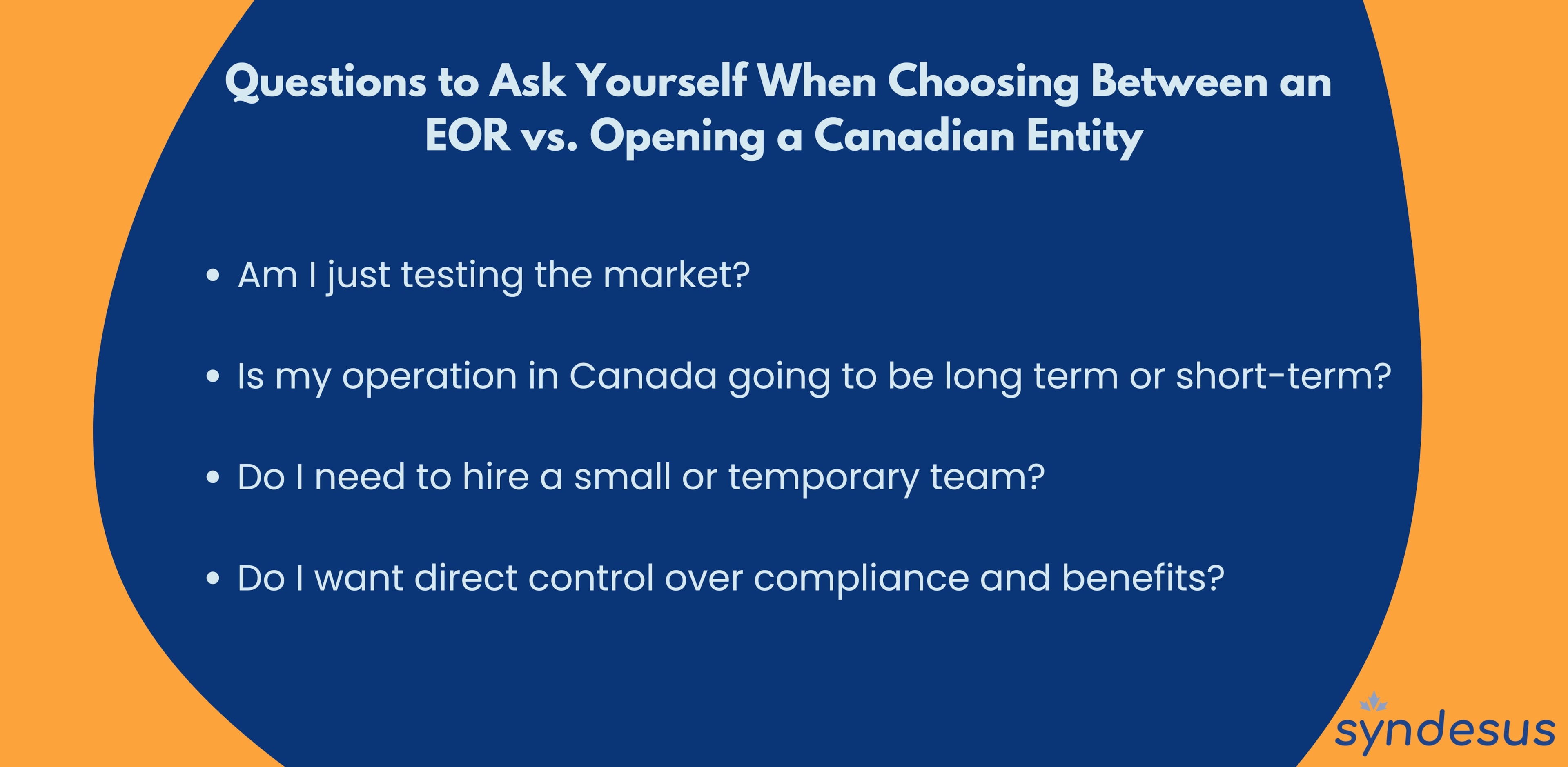As U.S.-based companies expand into Canada, they face a pivotal choice: should they set up a legal entity by registering a business in Canada, or should they rely on a global Employer of Record (EOR)? The question of registering a business in Canada vs. global EOR has become central for businesses considering international growth. While the global EOR model—sometimes also referred to as a professional employer organization (PEO)—provides a convenient way to hire Canadian employees without establishing a local entity, many companies are now making the shift toward direct registration. This shift is often driven by a desire to gain full control over employment contracts, achieve tax efficiency, and ensure compliance with Canadian employment laws and local labor laws.
But why are U.S. businesses increasingly choosing to establish their own legal entity in Canada? In this article, we’ll explore the benefits, challenges, and strategic considerations involved in choosing between a global EOR and registering a Canadian business entity.

Understanding Global EOR vs. Registering a Business Entity in Canada
When deciding between these options, it’s essential to understand the differences:
- Global Employer of Record (EOR): A global EOR, or PEO, offers global employment solutions by legally hiring employees on behalf of the company. This structure allows companies to hire Canadian employees without forming a local entity. The EOR manages payroll processing, employment contracts, employee benefits, and tax regulations, simplifying the compliance process. However, since the EOR holds the employment contract, the company has limited control over specific employment terms and local compliance management.
- Registering a Business Entity in Canada: Registering a Canadian entity involves creating a direct legal presence in Canada. This structure enables companies to hire employees directly, giving them full control over local operations, employment contracts, payroll processing, and adherence to Canadian employment laws. While this process requires more investment and legal setup, it allows for better alignment with local labor laws, greater employee engagement, and potential tax benefits.
Key Considerations in Registering a Business Entity in Canada
1. Control Over Employment Contracts and Employee Benefits
Companies aiming to create a cohesive corporate culture across international teams often find that direct control over employment contracts, benefits, and policies is essential. With a global EOR, the company must rely on the EOR’s standard employee benefits package, which may not align with the organization’s unique offerings or employment policies.
Example: A U.S.-based company with strong employee wellness programs might find it challenging to replicate these offerings under a global EOR, which may provide only standard benefits. By setting up a Canadian entity, the company can offer benefits tailored to Canadian employees, including health insurance options, Canada Pension Plan (CPP) contributions, and employment insurance benefits aligned with local expectations.
2. Compliance with Canadian Employment and Labor Laws
Compliance with employment laws is a critical factor when hiring employees in Canada. Canadian employment law is complex and varies across provinces, meaning that employment and labor laws in Ontario might differ from those in British Columbia or Quebec. A global EOR can handle basic compliance, but companies often find that direct oversight through a local entity provides a stronger foundation for full legal compliance, especially as the business expands.
Example of Compliance Complexity: Employment law compliance in Canada involves understanding both federal laws and provincial regulations related to holiday pay, overtime, and termination requirements. A registered entity allows companies to monitor these local employment laws more closely, adapting to regional requirements and avoiding potential penalties for non-compliance.
3. Financial Efficiency and Long-Term Cost Savings
Though global EOR services can provide a cost-effective entry point, ongoing monthly fees, compliance add-ons, and administrative costs can add up over time. For companies with long-term ambitions in Canada, these costs can make a local entity the more economical option in the long run.
Cost Comparison Example: A company hiring Canadian employees through a global EOR might incur monthly fees for each employee, along with additional costs for payroll processing, health insurance, and other benefits. With a registered Canadian entity, the company can manage payroll taxes, tax obligations, and employment insurance in-house or through local providers, potentially achieving long-term savings.
4. Access to Canadian Tax Benefits, Tax Credits, and Incentives
Establishing a legal entity in Canada enables companies to access several tax benefits, tax credits, and incentives available to local businesses. For instance, the Scientific Research and Experimental Development (SR&ED) tax credit provides financial rebates for companies conducting R&D in Canada, an invaluable advantage for businesses in technology or innovation-heavy fields.
Strategic Advantage Example: A U.S. company developing new software can claim SR&ED tax credits to reduce its effective tax rate on R&D expenses, a benefit that would not be available through a global EOR. Additionally, provincial tax incentives are often available to companies creating jobs or investing in local communities, adding another layer of financial advantage to entity registration.
5. Strengthening Corporate Identity and Employee Loyalty
Hiring employees directly through a Canadian entity can strengthen employee loyalty and improve retention. Canadian employees hired through an EOR may feel detached from the core organization, which can impact engagement, productivity, and loyalty. Direct employment fosters a stronger connection, helping employees feel like integral members of the organization’s mission and culture.
Example of Employee Connection: Consider a retail company expanding into Canada. When employees are hired directly by the company’s Canadian entity, they tend to feel more invested in the brand and committed to its values, as they’re part of the organization rather than contracted through a third party. This connection can lead to higher engagement, greater productivity, and better long-term retention.
6. Streamlined Financial Operations with Local Banking Access
Operating through a global EOR often involves international payroll processing, which can lead to delays, currency exchange fees, and unpredictable cash flow. By registering a Canadian entity, companies can set up a local bank account, simplifying payroll, tax obligations, and vendor payments.
Finance Example: A Canadian entity with a local bank account can process payroll deductions, CPP contributions, and tax remittances directly through the Canada Revenue Agency (CRA), reducing delays and improving financial accuracy. This structure also allows companies to save on currency exchange fees, simplifying financial planning and creating smoother operations.
7. Improved Talent Acquisition and Workforce Management Flexibility
For companies committed to long-term Canadian operations, establishing an entity can provide valuable flexibility in hiring and talent management. Registering a Canadian entity allows companies to build local recruitment partnerships, engage in regional job fairs, and strengthen their Canadian employer brand—advantages that are often unavailable when using a global employment solution like an EOR.
Example: A U.S. company looking to hire Canadian employees in the tech sector can collaborate with local universities and partner with Canadian recruitment firms to find specialized talent. A registered entity supports talent acquisition by establishing a local presence, creating clearer career paths, and enhancing the company’s appeal as an employer in Canada.
When an EOR is Still Beneficial for U.S. Companies Expanding into Canada
Despite the benefits of setting up an entity, a global EOR can still be advantageous for specific scenarios:
- Temporary or Project-Based Hiring Needs: For short-term hires or project-specific roles, an EOR offers an efficient solution without the overhead of registering a legal entity.
- Market Exploration and Testing: Companies exploring the Canadian market can use an EOR to test market viability without committing to a full business structure. This approach allows them to quickly hire Canadian employees and evaluate the market before establishing a permanent local entity.
- Small or Limited Operations: For companies hiring only one or two employees, the monthly costs associated with an EOR might be more cost-effective than entity registration, especially for businesses with limited expansion plans.

Conclusion
Still undecided between registering a business in Canada vs Global EOR? Choosing between a global EOR and registering a Canadian business entity ultimately depends on your company’s goals, workforce size, and long-term expansion plans. Global EOR services offer a streamlined and low-commitment entry into the Canadian market, ideal for companies testing the waters or managing small teams. However, for companies with long-term aspirations in Canada, setting up an entity provides greater control, cost efficiency, tax benefits, and deeper engagement with Canadian employees.
Looking to expand in Canada? At Syndesus, we specialize in EOR services and entity establishment to support U.S. companies entering the Canadian market. Whether you’re considering an EOR to hire Canadian employees quickly or planning to register a business entity for a long-term commitment, Syndesus provides tailored solutions to meet your unique needs. Contact us today to discover how we can support your Canadian expansion journey.

